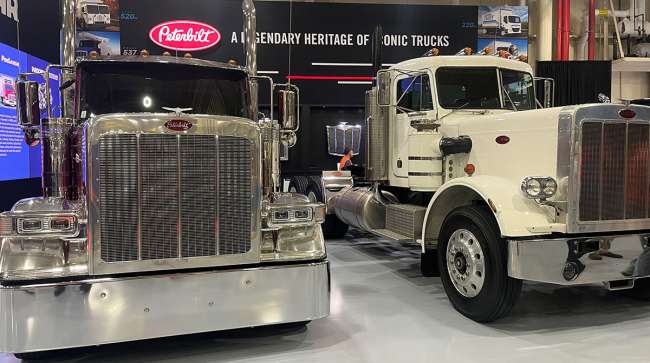Peterbilt trucks on display at the OEM’s Denton, Texas, facility. (Mike Senatore/Transport Topics)
Truck maker Peterbilt Motors Co. is relying on its flexibility as it traverses a market facing increasingly uncertain conditions.
The potential for tariffs on foreign trade continues to loom, threatening supply chains across North America. Peterbilt’s parent company, Paccar Inc., has manufacturing operations in the United States, Canada and Mexico, making these tariffs a point of interest for the original equipment manufacturer.
At a media briefing April 12, Jake Montero, Peterbilt’s general manager and vice president of Paccar, emphasized Peterbilt’s patient approach to managing customer relationships despite possible fluctuation on the horizon.
“It’s just something that we have to manage as it changes and as it evolves,” Montero said. “It’s been evolving quite rapidly, so staying close to our customers and being able to assist them and educate them based on the changes when we know what they are — that’s the partnership piece that we always go back to.”

Peterbilt General Manager Jake Montero emphasized the company’s patient approach to managing customer relations. (Mike Senatore/Transport Topics)
Peterbilt, based in Denton, Texas, is coming off a successful 2024, when it achieved a record heavy-duty market share of 15.3% and increased medium-duty market share by 1.3%, bringing the figure to 9% at the end of the year. It also reached a 21.2% share of the vocational and refuse market segment.
Montero highlighted a number of Paccar’s and Peterbilt’s accomplishments in 2024, including completing their first full year of production for the Model 589, reaching a milestone of 800,000 trucks assembled at its Denton plant and growing their dealer network to 432 locations.
He pointed to some of Peterbilt’s recent and upcoming product offerings — including LED headlights for the 589 and its medium-duty models and an enhanced smart display expected to launch later this year — as examples of Peterbilt’s larger goal of allowing customers a wide array of customization options.
The Peterbilt Model 589 offers unparalleled style, performance and reliability. Built for those who demand the best on the road.
Learn more: https://t.co/kd0IMe3wM2#Peterbilt #PeterbiltTrucks #PeterbiltPride #Model589 #ClassPays pic.twitter.com/UPKlhXWag9
— Peterbilt Motors Co. (@PeterbiltMotors) April 7, 2025
The overarching theme of flexibility is exemplified by one of the major projects at Peterbilt’s Denton plant: the increased implementation of autonomous-guided vehicles.
Since 2018, AGVs have been utilized at the Denton factory to assist a number of processes on the line, including in the engine trim and cab trim assembly areas. This year, Peterbilt implemented AGVs into its chassis line.
“It’s been a tremendous investment to make this factory able to accommodate a wide number of configurations,” Montero said.
The AGVs have a wide range of motion, making it easier for components to be moved or pulled off the line when needed and allowing employees to work on different components from any angle.

A chassis on the assembly line at Peterbilt’s plant in Denton, Texas. (Peterbilt Motors Co.)
The expanded maneuverability has increased flexibility in the production layout of the plant, allowing the assembly line to be modified and reconfigured as needed, strengthening the truck maker’s ability to meet its customers’ specifications.
The automation of labor-intensive work is visible throughout the facility; cabs are painted entirely by robotic arms, while chassis painting was described as an 85%-15% split between robots and humans.
One corner of the plant serves as a cab inspection point, which is carried out by artificial intelligence; electrical components are tested by an AI program, and any issues found are flagged on a monitor above the line, prompting employees to remove the cab and address the problem.






